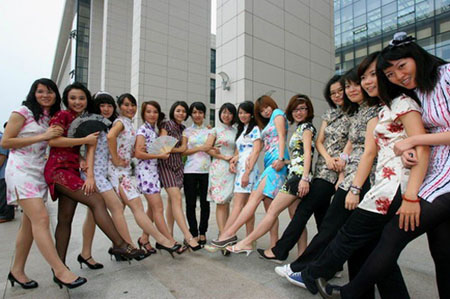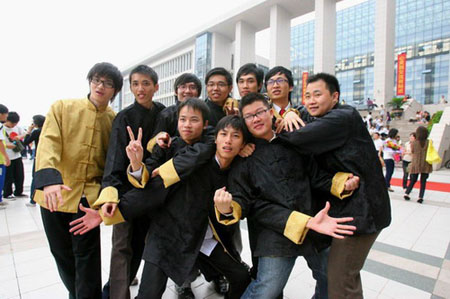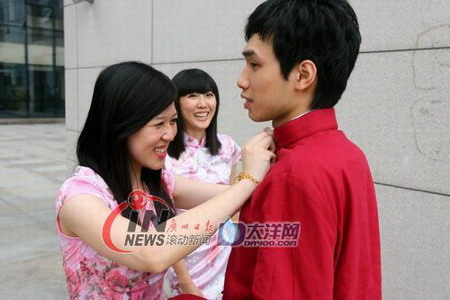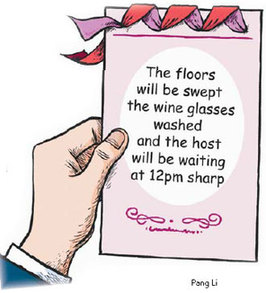Society
- Details
- By Chinadaily.com.cn
- Hits: 1136
Nine people were killed and 17 injured when a bus and truck collided Wednesday in north China's Inner Mongolia autonomous region, according to local work safety administration.
The crash occurred at around 10 a.m. on a highway near Qinjiayao Village of Xinghe County, Ulanqab City, when a bus from neighboring Hebei Province and an Inner Mongolia-registered heavy truck loaded with coal collided. Xinghe is 280 km northwest of Beijing.
On the bus were 26 passengers, eight of whom died at the scene and one died later in hospital. The dead were six men and three women. Further information on their identities was not immediately available.
The 17 injured, including one in serious condition, are receiving emergency treatment at two local hospitals.
Police are investigating the cause of the accident.
- Details
- By David Cao
- Hits: 1540




Student wearing traditional outfits pose for a photo during their graduation ceremony at Guangzhou University in Guangzhou, south China's Guangdong province in this undated photo.
Comments on Chinadaily.com.cn
Read more: Students in Chinese traditional outfits for graduation (photos)
- Details
- By David Cao
- Hits: 1596
The old man, Lin Shusen, living in Weijia Community Dongcheng District Beijing, designed and worked out an steam massage chair for his wife on his own.

Lin Shusen is showing us how the massage chair works.
"I spent 7 years, maybe 8 years, on this chair." Lin Shusen said. After he retired from an automobile repair plant, he used to climb the Jingshan Hill every day to enjoy his time, but his wife had a problem with her legs, can't went with him. The problem weighed on his mind.
About 2000, massage chair was getting popular in China. He dicided to make one for his wife by himself, hoping her can have a health life without walking down the doorstep.
Their children had tried to offer an factory-manufactured massage chair, but he refused, "I know what I need indeed."
Now his massage chair can offer wide-ranging massage services, including neck massage, foot massage, knee massage, eye massage, and so on.
Recently he added a new function to his massage chair - Steam Conduct. He is not satisfied with his massage chair and ask others not to call this massage chair as " The Final Version".
- Details
- By Andrew Moody
- Hits: 2051

Thousands of Chinese parents are turning their backs on Johnson & Johnson and other foreign brand baby care products after recent dramatic health scares damaged consumer confidence, according to a recent online survey.
In the first major test of public opinion since a US consumer group alleged that some baby products by the American giant contained traces of elements linked to cancer, three-quarters of nearly 120,000 consumers questioned by ifeng.com, said they had stopped buying Johnson & Johnson products.
Information from trade sources also suggests that Chinese customers are shunning foreign brands and opting to buy what they now perceive as more trusted local ones.
Such a switch is a reverse of last year's baby milk powder scandal when Chinese companies came under world focus for adulterating some products with melamine.
Recent health scares have not just centered on Johnson & Johnson but on the German company NUK, whose baby powder was found to contain asbestos, a known carcinogen.
Johnson & Johnson products have since been given the all-clear by the Chinese authorities while NUK's baby powder is still subject to a massive product recall.
Michelle Huang, research analyst at global market researcher Euromonitor International in Shanghai, said there has already been an impact on the supermarket shelves.
"There is evidence from trade sources that Johnson & Johnson's sales have been declining as a result of this. However, I think this could be a short-term impact. I think Johnson & Johnson brand loyalty is quite strong in China and so long as they can deal with this appropriately their sales should recover in the long run," she said.
Read more: Chinese consumers worried about Johnson & Johnson
- Details
- By Patrick Whiteley
- Hits: 1445
 A few Chinese friends have the very annoying habit of shooting out dinner invitations at the very last minute. The phone will ring late Saturday afternoon and a super slap-up at their favorite restaurant will be announced. Normally, to my sheer horror, a boisterous session at the local KTV tends to follow.
A few Chinese friends have the very annoying habit of shooting out dinner invitations at the very last minute. The phone will ring late Saturday afternoon and a super slap-up at their favorite restaurant will be announced. Normally, to my sheer horror, a boisterous session at the local KTV tends to follow.
"Ai ya," I say. "You guys do this every time. Why can't you give me more notice, I've already got something on."
Why can't they be more impeccably organized like their great, great, great grand parents?
Up until the beginning of the last century, a dinner invitation in China was a very ordered and structured ceremony and dinner guests were given oodles of notice.
A courier would be sent to a dinner guest's home delivering a very large red envelope containing a very large red card. The color red was a symbol of festivity and celebration so the recipient knew something was cooking at Mr Wang's courtyard home.
On the flashy piece of paper, and in the finest handwriting, was an invitation to a succulent banquet. It would state that on noon on the eighth of next month "the floors would be swept, the wine cups washed and the host will be ready, awaiting their arrival".
A second invite would arrive maybe a week later and a third on the morning of the big day.
The third invitation would demand punctuality to the minute. But, guests paid no attention to the stated time and would organize their hand-carried sedan for a 4pm arrival.
A last-minute mad rush again?
By mid afternoon, a fourth and final summons may be sent urging the guest to get a move on. That's right. Mr Wang sent four hand-written messages delivered by couriers each time.
All of this rigmarole was part of dinner invitation tradition, and every guest would land on Mr Wang's doorstep four hours late.
Maybe the practice of being "fashionably late" is yet another Chinese invention.
I discovered the details about the traditional dinner invitation party, and many other wonderful Chinese old-world tit-bits, from the writings of Herbert Allen Giles, who was a British diplomat in China in the late 19th century and also professor of Chinese at Cambridge University.
"A foreigner arriving in China for the first time will be especially struck by three points to which he is not accustomed at home," Giles once said in a lecture.
"The people will consist almost of entirely of men, they will all wear their heads platted in queues, and they will all be exactly alike.
"But he will soon find out that the Chinese men are not one bit like the countrymen of his own home in the West."
Giles' stories are fascinating, but sometimes only captured the customs of a small, wealthy class of the population.
These were the practices of the Qing governing elite, who could afford to send dozens of couriers dashing across town, and in which a foreign diplomat would mostly circulate.
Today's expats can rub shoulders with everyone - from farmers and teachers to factory owners and even government officials, and everybody seems to be in a mad rush.
My spur-of-the-moment, modern-day friends were amused by the dinner invitation customs of their forefathers and have promised to give more notice.
But can they?
Without really knowing it, they are caught in the flow of a pulsating energy, which is driving China through its amazing transformation. It's all about the now.
As Master Shi Fu in Kung Fu Panda says: "Yesterday is history, tomorrow is a mystery, so that's why we call today the present."
And the Chinese are tearing off the wrapping paper as fast as they can.
More Articles …
Page 221 of 255